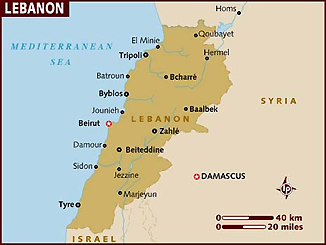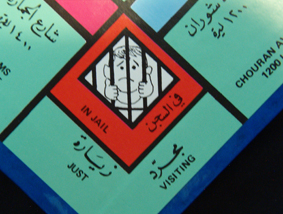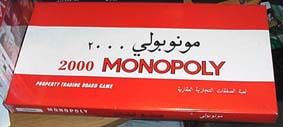 |
Number of versions:
3
Edition: December 17, 2010
|


Lebanon's location at the east end of the Mediterranian Sea caused this
country to be a regional center for finance and trade over centuries. Na de
Eerste Wereldoorlog,
on September 1920, it was France who formed the State of Greater Lebanon and 6
years later it formed the Lebanese Republic, although it remained a separate
entity from Syria. Lebanon gained independence in 1943.
Because there have not been a predominant British influence in this country there is
no reason to expect Waddington's Monopoly editions here over the Parker Brothers version.

Edition: Monopoly - Standard white box, without ref.nr.
Publisher: Unknown inland manufacturer - ▒1970
Dimensions of the box: ▒26 x 50 cm
The game:
This edition, that obviously is an illegal copy of Parker Brothers white
box editions must have been published in the turbulent period
between 1960 and
1980. There is no indication whatsoever proving it comes from the Parker
Brothers presses, contrary the quality
is poor, shown by the red,
soft plastic insert.
It is also uncertain this is a Lebanon game, as long as I am not in possession
of a gameboard from which the streets can be read.
However, there is a very great chance this really is a Lebanese edition,
because in this period many countries in this area copied
this Parker Brothers
edition!
 Edition:
Libano poly - De Luxe edition, without ref.nr.
Edition:
Libano poly - De Luxe edition, without ref.nr.
Publisher:Unknown inland manufacturer - ▒1980
Dimensions of the box: 26 x 50 cm
of the game board: 45.5 x 45.5 cm
The game:
This edition is owned by Steve Amato - N.Y.
 As
Steve saw something written on the little board shown on the cover he took his
magnifier and found on one side of the inner section: Made In Lebanon and on the other: Under Licence From Parker Brothers Division General Mill
Group Inc. U.S.A..
As
Steve saw something written on the little board shown on the cover he took his
magnifier and found on one side of the inner section: Made In Lebanon and on the other: Under Licence From Parker Brothers Division General Mill
Group Inc. U.S.A..
The conclusion must be drawn that the unknown manufacturer of this illegal
edition must have copied the image of the "game
board in a green
and blue
field with a horizontal red
bar" from an earlier issued official Parker edition made in Lebanon. This
design was used in the period
between 1960 and 1980, in which Parker was owned
by the American Cereals manufacturer General Mills!
Besides Parker Brothers exclusively and only use the word Monopoly
for all their games, with no exception, so Parker will never have allowed to
manufacture this edition.
 The
board is of heavy cardboard with a dark blue
marble back.
The
board is of heavy cardboard with a dark blue
marble back.
Differences of the design, with regard to the Parker Brothers' game board:
The properties (of which are at least a number from Beirut) are from Go
onwards:
Corniche Nahr - Community
Chest - Lebanon
- Income
Tax (Pay 2000L) - Port Station - Achrafieh
St. - Chance - Basta
St. - Chouran Ave - Jail
- Customs
House St. - Electric Company - Maarad
St. -Damascus St. -
Furn El Chebbak
Station - Martyrs Square - Community
Chest - Abou Bakr El Saddik St. -
Municipal
Stadium St . - Free Parking - Independence
Ave - Chance - Jewellers
Souk - Souk El Tawile -
Quarantina
Station -
El Arz
St. - Bechara El Khoury Ave
- Water Works - Bab
Idriss - Go To Jail - Kantari St.
- Trablos St.
- Community Chest - Phoenicia St.
- Nahr Station - Chance - Riad Solh
- Super
Tax (1000L) and Al Hamra St..
The property deeds are in Arab only except for the stations and
utility works! Their names are in English too. These cards are printed on
sheets of cardboard that are perforated.
The Chance and Community Chest
cards are printed on light yellow/beige colored cardboard. The writing on the
Chance cards is in blue and on the Community Chest
cards in  red. There is no writing
on the back to indicate which is which. They are each printed on a single
sheet of cardboard that is perforated.
red. There is no writing
on the back to indicate which is which. They are each printed on a single
sheet of cardboard that is perforated.
The banknotes looks like the Parker Bros. notes but had to be different
yet. So nothing else but the note's value is given in the ellipse, while 2 of the
small rectangular spaces are empty,1 of the other spaces shows the value
in Arabic and the other in Roman. They are all printed in color on white paper.
The 6
denominations are: 10 - 50
- 100 - 500 - 1,000 and
5,000. The currency
is Lebanese Pounds.
The tokens consist of 6 colored, plastic pawns with broad
base.
The houses and hotels are
of poor quality thick plastic without chimneys .
The Rules are on a thin sheet of paper that is
to be folded 2x. They are printed in Arabic only.
The dice are one red and one blue
with white dots.
 Edition:
2000 Monopoly, without ref.nr.
Edition:
2000 Monopoly, without ref.nr.
Publisher: Unknown inland manufacturer - 2000
Dimensions of the box: ▒25 x 49 cm
The game:
This is a set from the collection of Adi Wilk - Austin Tx -
USA.
Although the lid gives the impression this game to be an official Waddingtons
licensed edition, because of the red- white
-red design, I  would rather call it a "Made in Lebanon" illegal
copy.
would rather call it a "Made in Lebanon" illegal
copy.
At least it is remarkable the game to be according to the Waddingtons design
although these editions were already
published some 30 years before.
Should we had a copy of the game board, we might had been able from the
(bilingual?) names of the streets to decide from which country/city they are,
because the game could have been made for another country as well!
Neighter do we know anyting of the contents of the box, so the
only thing is sure it was manufactured in Lebanon and thus it will have
been for sale in that country as well.
Compare these editions with those of Syria and Saudi
Arabia.